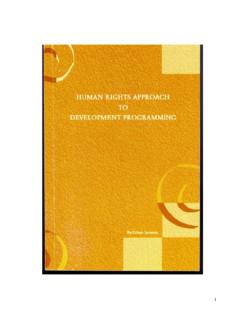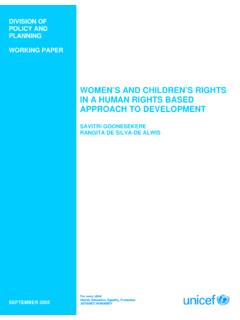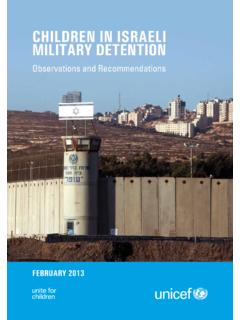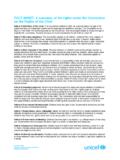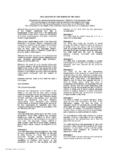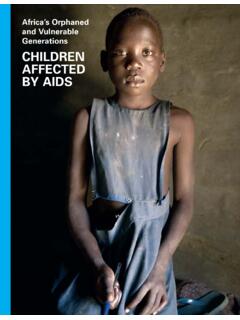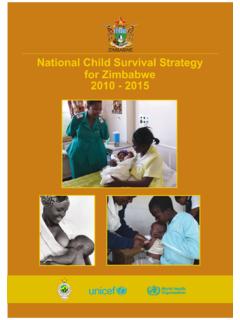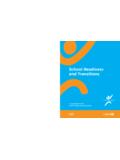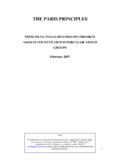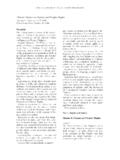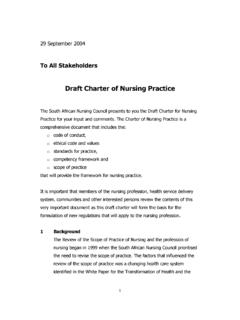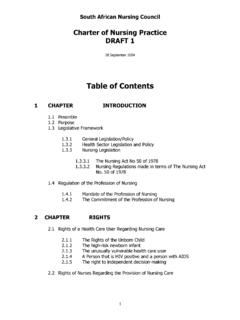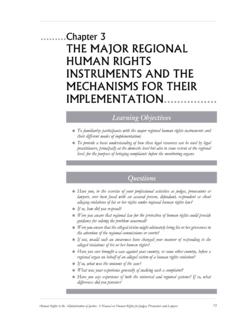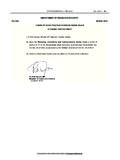Transcription of The African Charter on the Rights and Welfare of …
1 The African Charter on the Rights and Welfare of the Child PART 1: Rights AND DUTIES. ---------------------------------------- -------------------------------- CHAPTER ONE: Rights AND Welfare OF THE CHILD. Article 1: Member States of the Organization of African Unity Parties will recognize the Rights , freedoms and duties in this Charter and will adopt laws these Rights . Any custom, tradition, cultural or religious practice that is inconsistent with these Rights are discouraged. Article 2: A child means every human being below the age of 18 years. Article 3: Every child should be allowed to enjoy the Rights and freedoms in this Charter , regardless of his or her race, ethnic group, colour, sex, language, religion, political or other opinion, national and social origin, fortune, birth or other status. Article 4: If children can voice their opinions, then those opinions should be heard and taken into consideration during legal and administrative proceedings.
2 Article 5: Every child has a right to live. Article 6: Every child has the right to be named and registered at birth. Article 7: Every child who is capable of communicating his or her own views should be allowed to express his or her opinions freely. Article 8: Every child has the right to free association and freedom of peaceful assembly, in conformity with the law. Article 9: Every child has the right to freedom of thought, conscience and religion. Article 10: Children have a right to privacy. Article 11: Every child has the right to an education, to develop his or her personality, talents and mental and physical abilities to their fullest potential. This education also includes the preservation and strengthening of positive African morals, traditional values and cultures. Governments should also take special measures in respect of female, gifted and disadvantaged children, to ensure equal access to education for all sections of the community.
3 Article 12: Children have a right to play and to participate fully in cultural and artistic life. Article 13: Every child who is mentally or physically disabled has the right to special protection to ensure his or her dignity, promote his self-reliance and active participation in the community. Article 14: Every child shall has the right to enjoy the best attainable state of physical, mental and spiritual health. This includes the provision of nutritious food and safe drinking water, as well as adequate health care. Article 15: Children should be protected from all forms of economic exploitation and from performing any work that is likely to be hazardous or to interfere with their physical, mental, spiritual, moral, or social development. Article 16: Children should be protected from all forms of torture, inhuman or degrading treatment and especially physical or mental injury or abuse, neglect or maltreatment including sexual abuse. Article 17: Every child accused or found guilty of having broken the law should receive special treatment, and no child who is imprisoned or should be tortured or otherwise mistreated.
4 Article 18: Families are the natural unit and basis for society, and should enjoy special protection. Article 19: Children should, whenever possible, have the right to live with their parents. No child should be separated from his or her parents against his or her will, except when authorities believe is would be in the child's best interest. Article 20: Parents or other persons responsible for the child should always act in the best interest of the child. Article 21: Governments should do what they can to stop harmful social and cultural practices, such as child marriage, that affect the Welfare and dignity of children. Article 22: Children should not be recruited as soldiers, nor should they take a direct part in fighting wars. Article 23: Refugee Children should receive appropriate protection and humanitarian assistance. Article 25: Children who are separated from their parents should get special protection and should be provided with alternative family care.
5 States should also take all possible steps to trace and re-unite children with parents. Article 26: States should address the special needs of children living under regimes practicing racial, ethnic, religious or other forms of discrimination. Article 27: Children should be protected from all forms of sexual exploitation and sexual abuse. Article 28: Children should be protected from the use of narcotics and illicit use of psychotropic substances. Article 29: Governments should take appropriate measures to prevent the abduction, the sale of, or traffic of children for any purpose. Article 30: States should provide special treatment to expectant mothers and to mothers of infants and young children who have been accused or found guilty of breaking the law. Article 31: Children have responsibilities towards their families and societies, to respect their parents, superiors and elders, to preserve and strengthen African cultural values in their relation with other members of their communities.
6 CHAPTER TWO: ESTABLISHMENT AND ORGANIZATION OF THE. COMMITTEE ON THE Rights AND Welfare OF THE CHILD. Article 32: The Committee An African Committee of Experts on the Rights and Welfare of the Child hereinafter called `the Committee' shall be established within the Organization of African Unity to promote and protect the Rights and Welfare of the child. Article 33: Composition 1. The Committee shall consist of 11 members of high moral standing, integrity, impartiality and competence in matters of the Rights and Welfare of the child. 2. The members of the Committee shall serve in their personal capacity. 3. The Committee shall not include more than one national of the same State. Article 34: Election As soon as this Charter shall enter into force the members of the Committee shall be elected by secret ballot by the Assembly of Heads of State and Government from a list of persons nominated by the States Parties to the present Charter . Article 35: Candidates Each State Party to the present Charter may nominate not more than two candidates.
7 The candidates must have one of the nationalities of the States Parties to the present Charter . When two candidates are nominated by a State, one of them shall not be a national of that State. Article 36. 1. The Secretary-General of the Organization of African Unity shall invite States Parties to the present Charter to nominate candidates at least six months before the elections. 2. The Secretary-General of the Organization of African Unity shall draw up in alphabetical order, a list of persons nominated and communicate it to the Heads of State and Government at least two months before the elections. Article 37: Term of Office 1. The members of the Committee shall be elected for a tenn of five years and may not be re-elected, however. The term of four of the members elected at the first election shall expire after two years and the term of six others, after four years. 2. Immediately after the first election, the Chairman of the Assembly of Heads of State and Government of the Organization of African Unity shall draw lots to determine the names of those members referred to in sub-paragraph 1 of this Article.
8 3. The Secretary-General of the Organization of African Unity shall convene the first meeting of Committee at the Headquarters of the Organization within six months of the election of the members of the Committee, and thereafter the Committee shall be convened by its Chairman whenever necessary, at least once a year. Article 38: Bureau 1. The Committee shall establish its own Rules of Procedure. 2. The Committee shall elect its officers for a period of two years. 3. Seven Committee members shall form the quorum. 4. In case of an equality of votes, the Chairman shall have a casting vote. 5. The working languages of the Committee shall be the official languages of the OAU. Article 39: Vacancy If a member of the Committee vacates his office for any reason other than the nonmal expiration of a term, the State which nominated that member shall appoint another member from among its nationals to serve for the remainder of the term - subject to the approval of the Assembly.
9 Article 40: Secretariat The Secretary-General of the Organization of African Unity shall appoint a Secretary for the Committee. Article 41: Privileges and Immunities In discharging their duties, members of the Committee shall enjoy the privileges and immunities provided for in the General Convention on the Privileges and Immunities of the Organization of African Unity. CHAPTER THREE: MANDATE AND PROCEDURE OF THE COMMITTEE. Article 42: Mandate The functions of the Committee shall be: a) To promote and protect the Rights enshrined in this Charter and in particular to: (i) collect and document information, commission inter-disciplinary assessment of situations on African problems in the fields of the Rights and Welfare of the child, organize meetings, encourage national and local institutions concerned with the Rights and Welfare of the child, and where necessary give its views and make recommendations to Governments;. (ii) formulate and lay down principles and rules aimed at protecting the Rights and Welfare of children in Africa.
10 (iii)cooperate with other African , international and regional Institutions and organizations concerned with the promotion and protection of the Rights and Welfare of the child. b) To monitor the implementation and ensure protection of the Rights enshrined in this Charter . c) To interpret the provisions of the present Charter at the request of a State Party, an Institution of the Organization of African Unity or any other person or Institution recognized by the Organization of African Unity, or any State Party. d) Perform such other task as may be entrusted to it by the Assembly of Heads of State and Government, Secretary-General of the OAU and any other organs of the OAU or the United Nations. Article 43: Reporting Procedure 1. Every State Party to the present Charter shall undertake to submit to the Committee through the Secretary-General of the Organization of African Unity, reports on the measures they have adopted which give effect to the provisions of this Charter and on the progress made in the enjoyment of these Rights : a.
